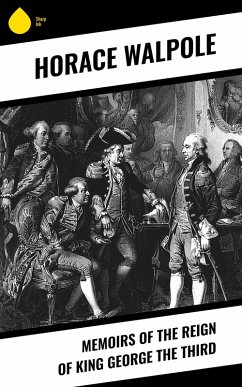
The History of King George the Third (eBook, ePUB)
All 4 Volumes
Redaktion: Marchant, Denis Le

PAYBACK Punkte
0 °P sammeln!
In "The History of King George the Third," Horace Walpole intricately weaves a narrative that blends political commentary with biographical sketches, showcasing the tumultuous reign of one of Britain's most controversial monarchs. Written in a lush, expressive style characteristic of 18th-century literature, this historical account offers both vivid descriptions and insightful analyses of events that shaped British society during George III's reign. Walpole's acute observation of the socio-political landscape situates the work within the burgeoning tradition of historical writing, paving the w...
In "The History of King George the Third," Horace Walpole intricately weaves a narrative that blends political commentary with biographical sketches, showcasing the tumultuous reign of one of Britain's most controversial monarchs. Written in a lush, expressive style characteristic of 18th-century literature, this historical account offers both vivid descriptions and insightful analyses of events that shaped British society during George III's reign. Walpole's acute observation of the socio-political landscape situates the work within the burgeoning tradition of historical writing, paving the way for future historians to explore the intersections of monarchy, government, and public sentiment. Horace Walpole, a prominent figure of the Whig party, was deeply embedded in the political milieu of his time. His experiences as a politician, along with his engagement in the cultural and intellectual life of the period, undoubtedly influenced his perspective on authorship and authority. Sherman's keen awareness of the events leading to the American Revolution, and his personal relationships with key political figures, lends a unique depth and authenticity to his historical narrative, reflective of his deep-rooted connections in political circles. This book is essential for readers interested in British history, politics, and culture. Walpole's meticulous research and articulate prose not only illuminate the complexities of George III's reign but also provide a fascinating lens through which to understand the broader implications of monarchy on governance and society. Readers will find it both informative and engaging, making it a worthwhile addition to any historical library.
Dieser Download kann aus rechtlichen Gründen nur mit Rechnungsadresse in A, B, BG, CY, CZ, D, DK, EW, E, FIN, F, GR, H, IRL, I, LT, L, LR, M, NL, PL, P, R, S, SLO, SK ausgeliefert werden.













